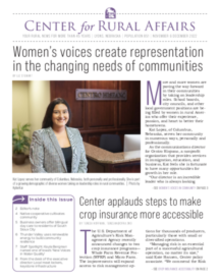Editor’s Note
Weekly since March, I have taken a deep dive into the history of sustainable agriculture through a limited series podcast distributed by the Center for Rural Affairs, “Sustainable Agriculture Podcast with Ron Kroese.” A new podcast is available each Wednesday, and I have the honor of completing the behind-the-scenes work of listening, writing a description, distributing to the various platforms, and promoting.
The podcast uses the audio of videos taped from 2015 to 2017, where Ron interviewed early leaders in the sustainable ag policy realm, including Ferd Hoefner, Wes Jackson, Ricardo Salvador, Chuck Hassebrook, Mark Ritchie, Lydia Villanueva, and more.
Each episode is unique and Ron coaxes out the best stories. My favorite episode so far has to be Ferd’s. In three hours—the longest episode—he explains the workings of every farm bill and legislation related to sustainable ag since the early 1970s. I learned so much.
Then among my top episodes are Kathleen Merrigan, former deputy secretary of USDA—I just want to be her friend; Lydia Villanueva who is such an inspiration as an advocate for diverse representation in the movement; and Don Bustos, a farmer in New Mexico. I absolutely love this quote from Don, “I like to tell people we still farm the same land our ancestors farmed 400 years ago, and we still use the same rituals and we still use the same tradition. We incorporate a little new technology that allows us to be economically viable.”
Our last episode, of 38, will be published at the end of November. However, the podcast series will remain available on all major platforms including Spotify, Audible, Apple, Google, and more.
If you haven’t checked it out, there are episodes on organic, small farms, diversity, alternative ag, environment, conservation, food co-ops, food security, food systems, and more.
Links to the original videos, show notes, and resource links can be found at cfra.org/SustainableAgPodcast.
Inside this issue
Women’s voices create representation in the changing needs of communities - More and more women are paving the way forward in their communities by taking on leadership roles. School boards, city councils, and other local government positions are being filled by women in rural America who offer their experience, passion, and heart to better their hometowns.
Center applauds steps to make crop insurance more accessible - The U.S. Department of Agriculture’s Risk Management Agency recently announced changes to two crop insurance programs—Whole Farm Revenue Protection (WFRP) and Micro Farm. The improvements will expand access to risk management options for thousands of producers, particularly those with small or diversified operations.
Native cooperative cultivates community - Corn is key to connecting Oneida Nation families to their ancestors. Fifteen families have come together to form the Ohe·láku Cooperative, in Wisconsin, in an effort and desire to become more self-sufficient.
Business owners offer bilingual day care to residents of South Sioux City - All parents want their children to be safe and happy—and to receive a good education. When Reyna Sibrian couldn’t find a day care that offered that kind of atmosphere for her kids, she decided to open her own.
Thunder Valley uses renewable energy to build community resilience - At Thunder Valley Community Development Corporation, located on the Pine Ridge Reservation, renewable energy plays an important role in a vision to build resilient communities while reducing environmental impact.
Staff Spotlight: Kayla Bergman named one of Iowa’s ‘New Voices in Water Quality’ - For her work to advance water quality and conservation goals, Kayla Bergman has received the New Voices in Water Quality in Iowa award.
From the desk of the executive director: Local meat lockers, keystone infrastructure - Last night, I made lamb burgers, seasoned with garlic and topped with tomatoes from my garden. In my basement, across from canned peaches, I have a freezer filled with a whole lamb and part of a grass-fed cow. Living near a local meat locker like the Oakland Meat Processing Plant, it’s easy to take access to quality meat from local growers for granted. It’s also easy to take for granted how vital that meat locker is to the local community.


